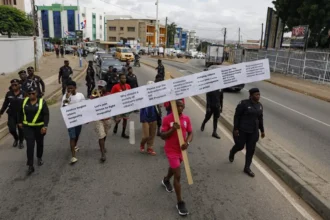By Amadou Keita
BAMAKO, MALI – Malian authorities, under military rule, have charged former Prime Minister Moussa Mara with ‘undermining the credibility of the state,’ ‘opposing legitimate authority,’ and ‘inciting public disorder’ over comments he made on social media. The charges stem from a July post on X (formerly Twitter) where Mara expressed solidarity with “prisoners of conscience” after visiting detained opposition figures.
Mara, who served as prime minister for nine months a decade ago, has become a prominent and outspoken critic of the military government that seized power in coups in 2020 and 2021.
On Thursday, Mara was detained and questioned for a second time by the national cybercrime unit regarding his 4 July X post. In the post, the ex-prime minister stated that his regular visits to those detained were to ensure that “the flame of hope never fades in them.” He added, “As long as the night lasts, the sun will inevitably rise! And we will fight by all means to make that happen, and as soon as possible!”
According to Radio France Internationale, the prosecutor at the cybercrime unit asserted that Mara’s reference to “prisoners of conscience” and his stated intent to fight for them constituted an offence.
On Friday, following his questioning, Mara was formally charged. He is now due to stand trial on September 29.
The move against Mara highlights the increasingly restrictive political environment in the West African nation. In May, the ruling junta dissolved all political parties following rare anti-government protests.
A month ago, the transitional parliament, established by the military, granted military leader General Assimi Goïta a five-year presidential term, which is renewable without the need for elections. Goïta, 41, who orchestrated the two coups, was initially named transitional president after the 2021 takeover and had promised to hold elections the following year. However, he has since reneged on that pledge, delivering a significant blow to international efforts to restore multi-party rule in Mali.









